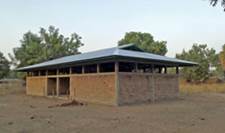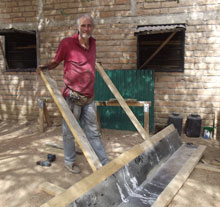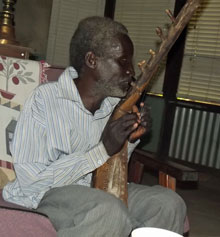
[Home] [Archived news updates and letters]
|
News Update from Mark
and Diane Vanderkooi February
3, 2017 Dear
family, friends, and supporters; After
our short visit to the USA over the holidays, we have resumed our
ministries here in Chageen among the Kwong. In this edition of our news
update, we offer a brief update of our work, and then reproduce an essay
which those of you who receive our paper newsletter have seen already,
but which will be new to our electronic audience. We hope both the
news and the essay will help you better understand our life and work
here in Chad and pray accordingly. Your fellow
servants, Mark and Diane |
|
Crossing
off one more item on our to-do list
It
is fair to say that during this season of getting the Kwong Bible school
operational, we are juggling quite a few more obligations than is either
comfortable or good for us. That’s just the way the chips fall and you
can all tell your own stories in that regard. However, a few days ago,
the load got quite a bit lighter when Mark and his tradesmen finished
the roof of the Bible school. There is quite a bit of interior finishing
to yet do, but none of the remaining tasks have quite the same
“ominosity” that the roof carried on Mark’s to-do list. The
task was difficult. It was 106 degrees for most of the week that Mark
and his tradesmen were on the roof, and the galvanized coating on the
corrugated iron was like a mirror reflecting the sun straight into their
eyes. (We intended to finish the roof before hot season, but hot season
showed up a month early. So much for strategic planning.) However, the
finished product is very satisfying, and some measure of the admiration
of local population can be gauged by the fact that the blind guy from
the next village down the pike (see side bar below) was exclaiming about
it merely on the merits of what he had heard from other people. Essay
– Missing the Poor
In
much the same way as a new missionary can’t help but reflect on what
he or she misses most about his or her own country, the veteran
missionary begins, as the years go on, to reflect on what it is about
his or her adopted home that he or she will miss most should ever the
day come when he is obliged to leave it. Some of those things are quaint
– the rich flavor of a bush chicken, the cooing of the doves in the
palm tree, the thrill of a tropical thunderstorm, or the fragrance of a
frangipani flower. Others, such as dear friends or co-workers or an
adoptive daughter are only what you would expect any well-adjusted human
who lived in a locale for decades to miss. But there are other things
for which the anticipated loss is not quite so obvious, and might even
seem counter-intuitive. One such thing for us is life among the poor. When
that day comes (and we hope it will not be soon), we will miss the
opportunity afforded to us here to “be there” for people who are at
their wits end and have nowhere else to turn. Now we must hasten
to add that while to the uninitiated observer (which would be just about
everybody who reads this missive) everyone in Chageen is poor – after
all, they live on 2 or 3 dollars a day – this is not whom we refer to
as the poor. No, most of the Kwong are “middle class” in the wider
scheme of the rural African economy. But there are among them those who
are genuinely destitute. They and their families go days at a time with
little to eat, and thus weakened, they succumb to dysentery and chronic
malaria rendering the hard labor of growing crops increasingly
difficult. And so a vicious cycle sets in which perpetuates their
destitution. Their children suffer most – and die most – their
parents having nothing with which to buy the 2 or 3 dollars’ worth of
medicine they need. They exhaust the good-will of their neighbors and
friends and they have nowhere to turn, and no one to help. Sometimes
their misfortune has its origins in a bitter Providence, and sometimes
– all too often – in their own foolishness. But that is a moot point
when a child’s lungs are filling with the fluid of malaria induced
pneumonia and her eyes are wild with the terror of being unable to
breath. It
is these people whom we will miss living among. Not, we again hasten to
add, because helping these folk affords us a kind of catharsis for a
rich man’s guilt complex, nor because we need to make up for some kind
of personal insecurity by being the heroes that save the day, nor
because we find the simple gospel of Jesus and the cross an embarrassing
anachronism in the 21st century, nor still because “the
poor” is a currently fashionable missionary buzz word that millennials
apparently swoon over, but rather because we have discovered quite by
accident that there is simply no blessing quite like being a blessing. Should
ever the day come when we must return to the USA, we despair of ever
enjoying this blessing. It is not of course that such people don’t
exist there, but rather that American society being sliced and diced the
way it is (think suburbs and inner city), renders it unlikely that a
WASP couple like ourselves would find ourselves in such close contact
with a community like Chageen. And no less significant is the reality we
enjoy here of an intimate knowledge of who’s who in the community such
that it is usually quite clear whom we should help and how, and when. We
doubt we will ever be the beneficiaries of such insight in the USA, and
without it, would be doomed to being gullible fools rather than a
blessing to anybody. But
for this season of life and in this place, we have this blessing, and it
is hard to overstate just what a blessing it is. One could almost say
that we humans were made to bless, and when suburban geography and
social barriers deprive us of that opportunity, we somehow become
incomplete as people. |
The
finished product. The building has two large classrooms – one for the
pastors and one for their wives, two offices, and a central lobby. The
360 degree clerestory windows allow maximum airflow and light, while the
wide eves should keep all but the most violent rain storms from blowing
in.
Mark
built his own sheet-metal bending brake to fabricate the ridge-caps.
Demander
André is blind, and he and his family frequently go hungry as a result.
He is also a talented harpist whose music is a regular feature on our
radio station. We do our best to help him and his family, but his case
is one where a culture of dependency is becoming more and more of an
issue. In years past, he actually did some pretty serious farming even
with his handicap. We don’t want him to lose that. |


